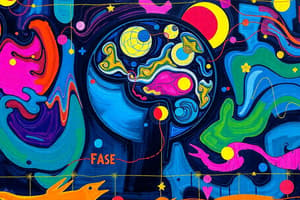Podcast
Questions and Answers
What happens when the mind is intact but lacks external mind-objects?
What happens when the mind is intact but lacks external mind-objects?
- There is a manifestation of consciousness.
- There is no manifestation of consciousness. (correct)
- Mind-objects become irrelevant.
- Conscious engagement occurs.
Which aggregate is included in the material form affected by clinging?
Which aggregate is included in the material form affected by clinging?
- Consciousness aggregate.
- Feeling aggregate.
- Perception aggregate.
- Form aggregate. (correct)
What does the Blessed One state regarding dependent origination?
What does the Blessed One state regarding dependent origination?
- It is a temporary state of being.
- One who sees it sees the Dhamma. (correct)
- Understanding it leads to enlightenment.
- It has no relation to the Dhamma.
What is the origin of suffering as described?
What is the origin of suffering as described?
What must be abandoned for the cessation of suffering?
What must be abandoned for the cessation of suffering?
What is essential for a manifestation of the corresponding section of consciousness?
What is essential for a manifestation of the corresponding section of consciousness?
How does one see dependent origination?
How does one see dependent origination?
What indicates that there is engagement in consciousness?
What indicates that there is engagement in consciousness?
Which of the following correctly states the relationship between aggregates and clinging?
Which of the following correctly states the relationship between aggregates and clinging?
What must one understand to see the Dhamma?
What must one understand to see the Dhamma?
What is primarily affected by clinging, according to the content?
What is primarily affected by clinging, according to the content?
Which statement reflects a critical aspect of the mind's interaction with external objects?
Which statement reflects a critical aspect of the mind's interaction with external objects?
How can the aggregates be characterized based on the content provided?
How can the aggregates be characterized based on the content provided?
What does the removal of desire and lust signify in the context of suffering?
What does the removal of desire and lust signify in the context of suffering?
Which of the following best describes the phrase ‘dependent origination’ in relation to the content?
Which of the following best describes the phrase ‘dependent origination’ in relation to the content?
What aspect of suffering is tied to the five aggregates, as described?
What aspect of suffering is tied to the five aggregates, as described?
Which of these best summarizes the teaching about the manifestation of consciousness?
Which of these best summarizes the teaching about the manifestation of consciousness?
What does the phrase ‘much has been done by that bhikkhu’ imply?
What does the phrase ‘much has been done by that bhikkhu’ imply?
In the context provided, what is suggested about the relationship between desire and the five aggregates?
In the context provided, what is suggested about the relationship between desire and the five aggregates?
What role does conscious engagement play in the manifestation of consciousness, as per the teachings?
What role does conscious engagement play in the manifestation of consciousness, as per the teachings?
Study Notes
Consciousness
- Consciousness arises when there is a mental object, an internal state of mind, and a conscious engagement.
- Consciousness is triggered by the interaction between internal mental states and external stimuli.
- If there is no conscious engagement, even if there is an internal state of mind and an external object, there will be no conscious experience.
Five Aggregates
- The five aggregates represent the fundamental components of experience which are affected by clinging:
- Form aggregate: includes the physical body and external world.
- Feeling aggregate: includes emotions and sensations.
- Perception aggregate: includes the ability to discriminate and identify objects.
- Formations aggregate: includes mental formations, thoughts, and intentions.
- Consciousness aggregate: includes awareness and the ability to experience.
- The text emphasizes that these five aggregates are interconnected and arise dependently.
Dependent Origination
- The text highlights the concept of dependent origination, suggesting that everything arises in relation to other factors.
- The five aggregates are dependently arisen and contribute to suffering through clinging.
Suffering
- Desire, indulgence, and holding on to the five aggregates are the root causes of suffering.
- The text emphasizes the need to abandon attachment to these aggregates in order to end suffering.
- Cessation of suffering: The text states that a bhikkhu who understands dependent origination and sees the five aggregates for what they are can attain the cessation of suffering through the removal of desire and lust.
Consciousness and Mind Objects
- Consciousness manifests when the mind is intact, external mind-objects are present, and there is conscious engagement with those objects.
- If any of these three elements are missing, consciousness does not manifest.
Aggregates of Clinging
-
The text describes five aggregates of clinging, which are the fundamental components of existence:
- Material form
- Feeling
- Perception
- Formations (mental factors)
- Consciousness
-
These aggregates are dependently arisen, meaning they arise in relation to each other.
Desire and Suffering
- Desire and lust associated with the five aggregates of clinging are the origin of suffering.
- Cessation of suffering comes from the removal of desire and lust for these aggregates.
Studying That Suits You
Use AI to generate personalized quizzes and flashcards to suit your learning preferences.





